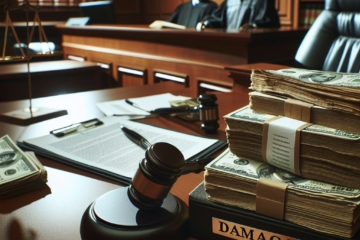Navigating the landlord-tenant relationship in British Columbia, particularly in the commercial sector, requires a solid understanding of the rights and responsibilities defined by the law. When a tenant defaults on their lease, a landlord faces a unique set of challenges. This article explores the rights of commercial landlords against defaulting tenants in British Columbia.
Table of contents
What is ‘Default’?
In the context of a commercial lease, a tenant is typically considered to be in default when they fail to comply with the terms of the lease agreement. Common examples of default include:
- Failure to pay rent
- Unauthorized alterations to property
- Subletting without permission
- Engaging in illegal activities on the premises
- Failure to maintain the premises in good condition
Understanding what constitutes default is crucial for landlords as it dictates their subsequent actions.
What are the Rights of Commercial Landlords?
A. Right to Terminate the Lease
Under the common law principles applicable in British Columbia, landlords have the right to terminate a lease if a tenant is in default. This right is often outlined in the lease agreement itself by way of a termination clause.
Termination clauses are critical components of commercial lease agreements, providing both landlords and tenants with clear guidelines on how the lease can be ended under specific circumstances. These clauses outline the conditions that may trigger termination, such as failure to pay rent or breaches of lease terms.
Typically, a termination clause will specify:
- Notice Requirements: The amount of notice either party must give before terminating the lease, ensuring both sides have an opportunity to address any issues.
- Cure Period: A timeframe during which a tenant can rectify a default (e.g., paying overdue rent) before the landlord can terminate the lease.
- Termination Process: Steps that must be followed to formally terminate the lease, which can help prevent misunderstandings or legal disputes.
Having a well-defined termination clause protects the interests of both landlords and tenants, providing clarity and legal standing in the event of a lease dispute. It’s essential for both parties to understand these provisions to ensure a smooth leasing experience and to know their rights and obligations should termination become necessary.
B. Right to Re-Entry
In British Columbia, commercial landlords have the right to re-enter leased premises under specific circumstances, particularly in cases of tenant default. The right to re-entry is governed by both statutory law and common law principles, which provide a framework for when and how landlords can exercise this right.
This right arises when a tenant fails to pay rent; is in breach of lease terms such as unauthorized alterations, engaging in illegal activities or failing to maintain the property; the lease is terminated due to a breach or a qualifying event. The following are a list of steps for commercial landlords to take before re-entering the premises:
- Review the lease agreement
- Provide written notice
- Allow a cure period
- Ensure peaceful re-entry
- Document the condition of the property
- Seek legal advice to ensure compliance and mitigate risk of disputes.
The above steps are important to avoid any claims of unlawful eviction or damages.
C. Right to Recover Rent & Damages
If a tenant defaults, landlords have the right to pursue the collection of unpaid rent and any damages resulting from the tenant’s breach. Landlords must keep thorough records and documentation of any damages or unpaid amounts to support their claims if they decide to take legal action.
D. Right to Mitigate Damages
Under British Columbia law, landlords have an obligation to mitigate damages following a tenant’s default. This means that landlords should make reasonable efforts to re-let the property to minimize their financial losses. Courts typically expect landlords to use appropriate strategies to advertise the property to attract new tenants and screen potential tenants. Failing to take reasonable steps to mitigate damages can impact a landlord’s ability to recover losses in court.
E. Right to Retain Security Deposits
Most commercial leases require tenants to provide a security deposit. In cases of default, landlords have the right to retain this deposit to cover unpaid rent or damages. However, it is important for landlords to check the terms of their lease agreement and follow the terms outlined regarding the use of security deposits.
F. Right to Pursue Legal Action
If a tenant fails to remedy the default and negotiations do not yield results, landlords may need to pursue legal action. This can involve filing a claim in the appropriate court to recover unpaid rent or damages or seeking a court order to regain possession of the property. It should be noted that legal proceedings can be complex and time-consuming.
Legal Framework Governing Commercial Leases
The rights of commercial landlords in British Columbia are primarily governed by the following:
- Commercial Tenancy Act, RSBC 1996, c 57
- Common Law i.e. principles established by case law
- Lease Agreement
Best Practices
Commercial landlords should always:
- maintain clear documentation of all communications with tenants;
- adhere strictly to the terms outlined in the lease agreement, particularly regarding notices and termination procedures;
- address defaults quickly and immediately; and
- consult legal professionals to ensure that actions taken are in compliance with the law and your best interests are protected.
Important: Please note that the information here is not meant to be legal advice. Do not solely rely on the information given here; it is important that you consult with a lawyer regarding any legal advice. Pax Law Corp. is not responsible for any reliance on the contents of this blog post. Any faces posted on this blog post is totally AI generated and they are not intended to represent any person in the real world. Any similarities are completely coincidental.
Pax Law can help you!
Our lawyers and consultants are willing, ready, and able to assist you. Please visit our appointment booking page to make an appointment with one of our lawyers or consultants; alternatively, you can call our offices at +1-604-767-95.



0 Comments